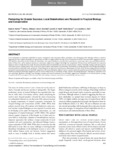Please use this identifier to cite or link to this item:
http://www.alice.cnptia.embrapa.br/alice/handle/doc/511990| Title: | Partnering for greater success: local stakeholders and research in tropical biology. |
| Authors: | KAINER, K. A.  DiGIANO, M. L.   DUCHELLE, A. E.   WADT, L. H. de O.   BRUNA, E.   DAIN, J. L.   |
| Affiliation: | Karen A. Kainer, University of Florida; Maria L. DiGiano, School of Natural Resources and the Environment; Emy E. Duchelle, School of Forest Resources and Conservation; LUCIA HELENA DE OLIVEIRA WADT, CPAF-AC; Emílio Bruna, University of Florida; Jonathan L. Dain, University of Florida. |
| Date Issued: | 2009 |
| Citation: | Biotropica, Gainesville, v. 41, n. 5, p. 555-562, 2009. |
| Description: | Local communities are important stakeholders in resource management and conservation efforts, particularly in the developing world. Although evidence is mixed in suggesting that these resident stakeholders are optimal forest stewards, it is highly unlikely that large tracts of tropical forests will be conserved without engaging local people who depend on them daily for their livelihoods. Stakeholders, who reside in biodiverse ecosystems like tropical forests, are the largest direct users and ultimate decision-makers of forest fate, can be important investors in conservation, harbor local ecological knowledge that complements Western science and frequently have long-term legitimate claims on lands where they reside. Research partnerships with local stakeholders can increase research relevance, enhance knowledge exchange and result in greater conservation success. Different phases of the research cycle present distinct opportunities for partnership, with flexibility in timing, approaches and strategies depending on researcher and local stakeholder needs and interests. Despite being the last step in the research process, dissemination of results can be the best starting point for researchers interested in experimenting with local stakeholder engagement. Still, tropical biologists might not choose to partner with local people because of lack of institutional rewards, insufficient training in stakeholder engagement, insecure research infrastructure in community settings, and time and funding limitations. Although not appropriate in all cases and despite significant challenges, some biological scientists and research institutions have successfully engaged local stakeholders in the research process, proving mutually beneficial for investigators and local people alike and resulting in important innovations in tropical biology and conservation. |
| Thesagro: | Comunidade rural Agricultura sustentável Floresta tropical úmida Proteção ambiental Pesquisa Parceria Pesquisador Agricultura de Subsistência |
| NAL Thesaurus: | Community supported agriculture Stakeholders Subsistence farming Sustainable agriculture Tropical forests Cooperative research |
| Keywords: | Investigación cooperativa Agricultura comunitaria Agricultura sustentable Bosques tropicales Grupos de interés |
| ISSN: | 1744-7429 (online) |
| DOI: | 10.1111/j.1744-7429.2009.00560.x |
| Type of Material: | Artigo de periódico |
| Access: | openAccess |
| Appears in Collections: | Artigo em periódico indexado (CPAF-AC)  |










